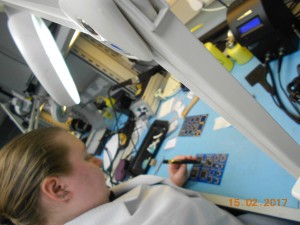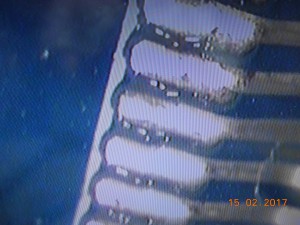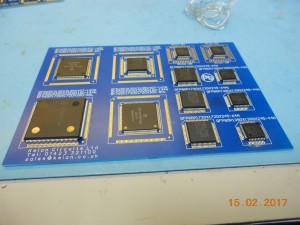 As electronics apprentice, soldering is one of the many skills that is required not only for design and construction but also for the repair of circuits and equipment.
As electronics apprentice, soldering is one of the many skills that is required not only for design and construction but also for the repair of circuits and equipment.
Soldering is the method of bonding two or more items together; mainly for the bonding of electronic components to a PCB (Printed Circuit Board). Soldering may look easy but it’s not as simple as it looks. Anyone can solder but doing it correctly and producing a suitable joint is the difficult bit.
To produce a good solder joint you have to have your soldering iron set at the correct temperature, use a suitable sized tip that has been well looked after and have a clean surface that hasn’t been oxidised. You then have to heat the pin and pad up correctly before applying the correct amount of solder, which is available in many different sizes.
Not using the correct techniques or holding the required skills can result in what is known as a bad joint. There are many different types of bad soldered joints, from cold joints (where the solder hasn’t melted fully before the heat was removed) and insufficient wetting joints (Where the pad of the PCB or the pin of the component hasn’t been heated and the solder hasn’t been given time to flow) to overheated joints. There can also be bad joints due to too much solder or not enough, solder bridges (shorts), pads can also be lifted and even solder splatters can cause problems. Whether it is now or ten years down the line, all these things will result in failure.
To make things more difficult, components aren’t just through-hole (Pushed through a hole and soldered on the other side), they are now also available surface mount. This means you also have to place components correctly over a pad and solder to the pad or use solder paste.
At the university most PCB’s are populated using through-hole components. But the University is starting to incorporate a lot more surface mount components into the many PCB’s that are designed and constructed. As well as this, most equipment that we repair contains surface mount components. This requires electronic technicians to be able to solder and de-solder through-hole components as well as surface mount.
As an apprentice I haven’t had much experience when it comes to surface mount components. But being able to solder them and produce a good joint is an essential skill which is needed. For this reason I attended an introduction course and an advanced course in soldering surface mount components.
The course was in Leeds, and ran for 3 days. Moving from conventional through-hole soldering to working with surface mount components was daunting. Soldering surface mount was completely different and new techniques were required and new skills had to be mastered.
I went from soldering basic Surface mount Chips incorrectly to being able to solder 160 pin Quad flat packs to class 1, 2 and 3 standards.
I learnt how to not onl y solder the components using different methods, but also how to remove them, re-align them and prepare/clean the PCB for reworking; a necessary skill for prototype circuit building and repair. I gained techniques in the diagnosis of faults as well and the implications of ESD during handling, storage and packaging of components.
y solder the components using different methods, but also how to remove them, re-align them and prepare/clean the PCB for reworking; a necessary skill for prototype circuit building and repair. I gained techniques in the diagnosis of faults as well and the implications of ESD during handling, storage and packaging of components.
The Surface Mount Soldering Course has aided me immensely giving me skills and knowledge and more importantly confidence to complete surface mount jobs given.
Being part of the Apprenticeship scheme gives you many opportunities to improve on skills and knowledge which is essential to your chosen career path, opportunities which aren’t as available outside of the University environment. I am always grateful for opportunities offered to me, especially when they aid me in my career and allow my passion and enthusiasm to grow.


